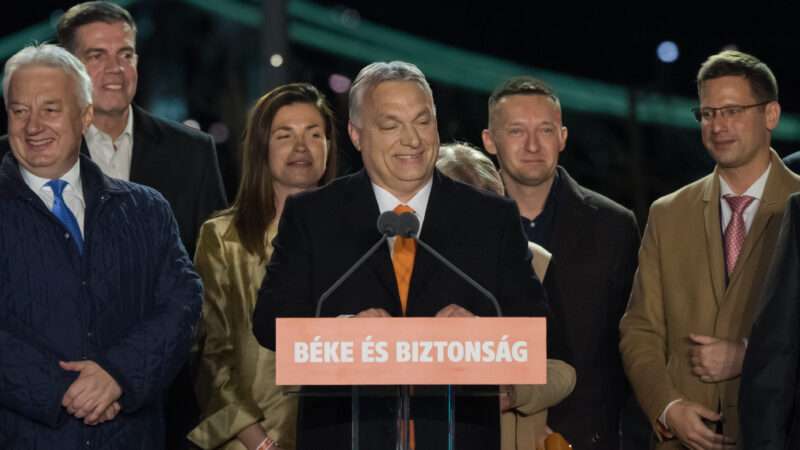
Westerners, used to thinking about liberal democracy as a package deal, rarely stop to consider the ways in which the two components can work against each other. Liberalism has to do with the protection of rights and liberties for all members of a society. Democracy has to do with rule by the people, whether directly or through representative elections. But what if a population uses democratic processes to empower an illiberal regime?
On Sunday, the Hungarian people voted in a landslide to give Prime Minister Viktor Orbán his fourth term since 2010. Current tabulations give parties allied with the incumbent leader a vote share above 53 percent, an outright majority.
Orbán is a self-proclaimed proponent of "illiberal democracy," which distinguishes, in Amnesty International's summation, "a fully democratic 'Western' system based on liberal values and accountability from what he calls an 'Eastern' approach based on a strong state, a weak opposition, and emaciated checks and balances." Orbán has spent more than a decade engaging in aggressive gerrymandering, court packing, use of state power to drive out or co-opt dissenting media, and more. Corruption is rampant. The Constitution has been rewritten and ever more power concentrated at the top.
The Organization for Security and Co-operation in Europe, which took the rare step of sending a full election-monitoring mission to Hungary, has raised questions about the vote. So arguably the country should not be thought of as particularly democratic or particularly liberal right now. The nonprofit Freedom House rates it as only "partly free" and gives it 45 out of 100 democracy points, making it a laggard among European nations on both counts.
At the same time, Orbán's sweeping victory suggests that many millions of Hungarians, well aware of his record, are on board with his vision for their country. This raises the specter of a true illiberal democracy—it shouldn't be hard to imagine a country with genuinely fair and open elections but also majority support for authoritarian leaders and policies that deny equal rights to all.
The point of contemplating such a scenario is to recognize that "assaults on democracy" are not the only threat we face. A society in which 51 percent of a population votes to oppress the other 49 percent can claim the mantle of democracy. The problem is that it is illiberal, not undemocratic.
Democratic institutions, important as they are, only get us so far. We must insist on liberalism as well: free speech, private property protections, religious liberty, freedom of movement, constitutional constraints and separations of power and rule of law and all the rest. We can't know which side of the 50 percent mark we'll fall on; the less of our lives we allow to be put to a vote in the first place, the better off we'll be.
The post Viktor Orbán's Reelection Shows Mere Democracy Is Not Enough appeared first on Reason.com.







